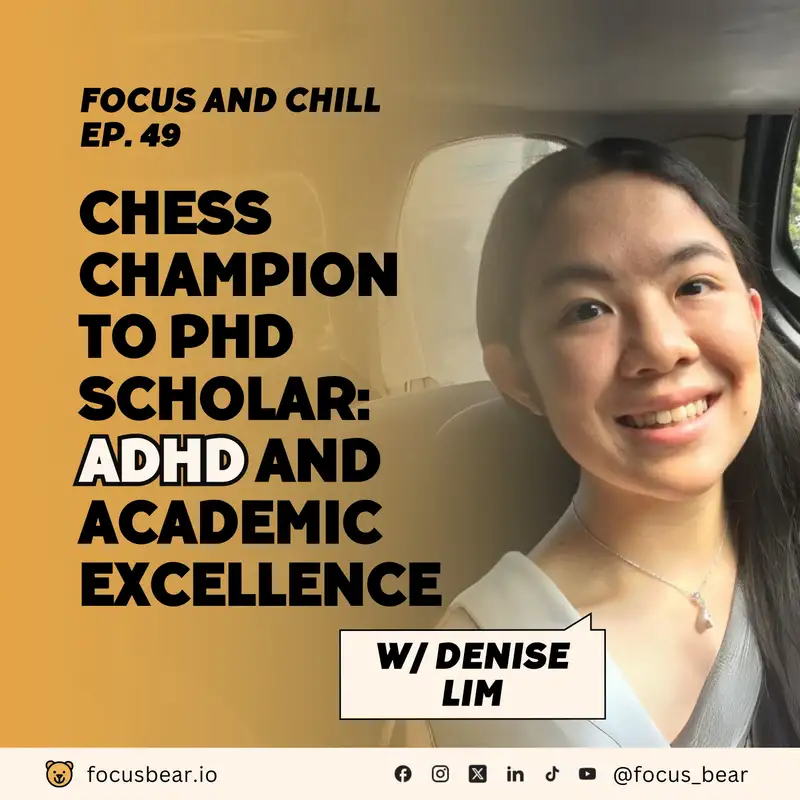Welcome to episode #49 We’re thrilled to be joined by Denise Lim today.
Denise is a PhD student at Griffith University, where she is currently investigating factors that contribute to academic motivation amongst intellectually gifted students with ADHD in secondary schools, a population she is extremely passionate about given her lived experience and challenges during that time. Denise has completed a Bachelor of Science with a psychology major, her psychology honors, followed by a graduate certificate in educational research, which provided her with the foundation for her PhD.
In 2022, she worked with a team at The Matilda Centre at the University of Sydney to conduct the world’s biggest umbrella review of COVID-19 and mental health outcomes, which was published in March 2023. She enjoys spending time with her two Guinea pigs Squashi and Squishi, has won multiple state and national titles for chess and table tennis, and recently ranked in the top 10 for speed jigsaw puzzling in Australia.
Welcome to the show Denise!
Questions
- Can you tell us about your experience with neurodiversity? When did you realize that you weren’t neurotypical? What challenges did you face? What is it like now?
- During school, grades were very inconsistent, particularly with compulsory subjects. B+ average but never got B+ - always had really good days where she smashed it (particularly oral assignments) and other days where she got low marks even though she was trying really hard the whole time
- Teachers said things like “I can see you’re really smart. You’re so good at Chess. How come you can’t…?”
- Grade divergence got worse as demands escalated during high school and uni
- At the end of her first degree, a friend shared that she had been diagnosed with ADHD and that inspired Denise to seek a diagnosis
- Post diagnosis and treatment (meds), her performance in honors + subsequent tertiary study has been consistently high distinctions. She’s learned to work with her brain instead of against it.
- What "work" projects are you concentrating on?
- PhD research looking into motivational theory for twice exceptional (intellectually gifted + neurodivergent) students
- The goal is to come up with a personalized motivational framework for each student so they can perform at their best
- How about the rest of the time? What do you enjoy doing in your off time?
- Speed puzzling (started during COVID to ward off depression and is now something she loves doing)
- Table tennis + Chess coaching
- What does your start of work routine look like and how has it evolved over time?
- Jigsaw puzzling - a form of mindfulness
- Listens to textbooks via Voice Dream. Currently listening to “Handbook of self-determination theory”
- Both activities get her in the zone for deep work
- What do you do to optimize productivity during your working hours?
- Multimodal input/output: uses whiteboard/iPad/iPhone/laptop depending on the type of work and how she’s feeling
- Wobble chair to give her movement during meetings
- Working on trains: go from one end of the train line to another - being in motion helps her focus (planes are also good but expensive)
- Rewards: get bubble tea after a deep work session
- Body doubling: shut up and write sessions where several students get together and write (no talking)
- COMMERCIAL BREAK
- How do you switch off at night?
- Feed Squishi and Squashi (guinea pigs)
- What resources (books/audiobooks, philosophies, apps, sensory toys) do you find most helpful for productivity and habit formation?
- Apps:
- Voice Dream (text-to-speech app)
- Books
- Atlas of the Heart by Brenee Brown
- Sensory toys:
- A multitude of spinners mostly from Kaiko
- Where can people connect with you or find your work?
- Griffith Uni page
- Do you have any final words or asks for our audience?
- Talk to other people about your neurodivergence. If her friend hadn’t shared with Denise, it would’ve taken Denise much longer to realize why everything was so hard. Pass on that gift to others.
 Episode 48
Episode 48